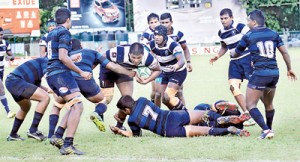Rugby has spread but has it developed?
View(s):The school rugby league has seen the end and the champions were decided on Saturday. The league was completed successfully and credit should be given to the Sri Lanka Schools Rugby Football Association the organisers of the schools tournament. On the way to the end there may have been a few hiccups but it did not develop to be a chronic bronchitis. Issues were managed preventing anything that would have put the game in jeopardy.
 This year the issue of red cards has been minimal with all knowing the consequences that could have followed. The schools league is not the A segment alone but has over 200 games played in different segments at the under twenty group and played in different parts of the country. There are a few more games to be played and the next stage will be the tournaments for the lower age groups. In that respect the schools sections should be commended as this is done amidst difficulty in finding grounds which does a worry and results in matches have to be played starting from 10.00 am in the lower segments. That is something that needs serious addressing in spreading and developing the game.
This year the issue of red cards has been minimal with all knowing the consequences that could have followed. The schools league is not the A segment alone but has over 200 games played in different segments at the under twenty group and played in different parts of the country. There are a few more games to be played and the next stage will be the tournaments for the lower age groups. In that respect the schools sections should be commended as this is done amidst difficulty in finding grounds which does a worry and results in matches have to be played starting from 10.00 am in the lower segments. That is something that needs serious addressing in spreading and developing the game.
The game has spread but whether it has developed is a question to be asked as we see a huge gap in the standard of rugby played by those in group A of Segment one as compared to those in the other groups in segment 1 2 and 3. One thing I noticed is that with the emphasis on slower scrum calls and release of the tackler and the ball there seem to be less pile ups and scrum resets and collapses even at the lower segment.
Last week watching the Royal-Joseph’s match there was a time when a ruck was pushed and the ball was over the goal line. It appeared that the attacking team as well as the defense did not seem to know that the ruck is only in the field of play and if you touched down even that it was legal. A try went a begging while the defense had extra work to do as if they touched down the result would have been a 22 metre drop out. On the other hand this match saw the Royal maul being effectively challenged and somewhat neutralised. The point here was to disrupt the formation and also to defend the break away. This was in contrast to the arguments that were floating about not engaging the consequences and the implications of the law. Tony Amit, a veteran coach who has always been talking about the negative aspect of not engaging has been addressing the way he would have tackled the rolling maul. I wonder whether he has been talking loud and some have heard what he has been saying.

Both St. Joseph’s and S. Thomas’ have improved impressively
Last week Joes almost upsetting Royal was a talking point. They may have won this match and put Royal on the back foot if not for that they lost a key player who was shown a yellow card. And that was for collapsing a maul and happened twice in succession while defending their 5 metre line. The scrum collapses, collapsing mauls and repeated infringements are a common sight in rugby Sri Lanka. We have seen teams adhering to slower scrum calls and making the scrum steady as well as quick release at the tackle. A little more time and many of these irritants will get sorted and also those who talk of what they saw on Setenta will realise that there is a difference .
The other game that surprised all was St. Peter’s being defeated by S. Thomas’ Mount who almost defeated the Joes two weeks before. I always thought the Thomas’ side are a capable lot but did not click and the signs seem good for next year. As some say “Ours is a young side”. Another thing that impressed me was the supporters that followed them despite that they were fighting at the bottom of the barrel. Another interesting fact is that the two top teams are coached by locals. This and another point of note is that all matches have been handled by local referees. Despite the statement made to the stakeholders by SLRFU that the way things are we may not have referees in the next five years the light is seen but not bright as one would expect. Not bright because of the many arm chair referees who still keep throwing insults to those who dare to be on the field and at times questioning the pedigree of the whistlers who take the risk while others remain critical.
Much was seen of the ability to take the whistle as the SLRFU referees interim committee wanted the schools to appoint referees for all junior matches other than the under 18 games. Schools that have many who profess knowledge on the side line have failed to find referees for junior games. Few schools have found school boys to do the mini rugby matches and Royal seem to have supplied the most. Even to an extent where some of their students referee matches elsewhere. The question is what about the others including those who have a lot to say even to a school boy who has made possible to play the game. Continuing this way is important and school can get ready for the next year.
* Vimal Perera is a former player, coach, referee and an IRB Accredited Referees’ Educator


